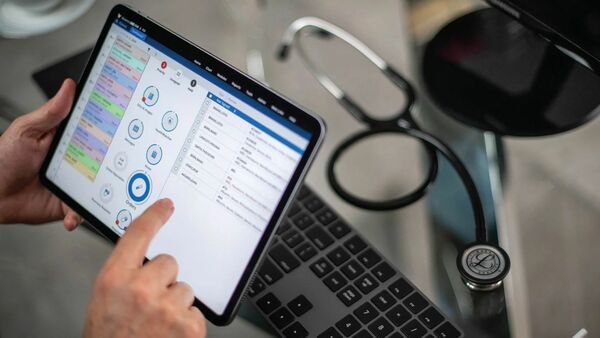Notifications
ALL BUSINESS
COMIDA
DIRECTORIES
ENTERTAINMENT
FINER THINGS
HEALTH
MARKETPLACE
MEMBER's ONLY
MONEY MATTER$
MOTIVATIONAL
NEWS & WEATHER
TECHNOLOGIA
TV NETWORKS
VIDEOS
VOTE USA 2026/2028
INVESTOR RELATIONS
DEV FOR 2025 / 2026
ALL BUSINESS
COMIDA
DIRECTORIES
ENTERTAINMENT
FINER THINGS
HEALTH
MARKETPLACE
MEMBER's ONLY
MONEY MATTER$
MOTIVATIONAL
NEWS & WEATHER
TECHNOLOGIA
TV NETWORKS
VIDEOS
VOTE USA 2026/2028
INVESTOR RELATIONS
DEV FOR 2025 / 2026
 Fidelity EHR -
9 hours ago -
Business -
25 views -
0 Comments -
0 Likes -
0 Reviews
Fidelity EHR -
9 hours ago -
Business -
25 views -
0 Comments -
0 Likes -
0 Reviews

Why do so many behavioral health providers struggle to balance compassionate care with administrative chaos? For organizations serving vulnerable populations—where clients often rely on government-funded programs—the answer often lies in outdated systems. Enter EHR systems for behavioral health, designed to simplify documentation, enhance collaboration, and ensure compliance. But how exactly do these systems revolutionize care delivery, and what makes them indispensable for modern practices? Let’s explore.
Why Do Behavioral Health Providers Need Specialized EHR Systems?
Behavioral health care is inherently collaborative, involving therapists, psychiatrists, and social workers across multiple locations. Traditional EHRs built for physical health often fail to address needs like progress notes (SOAP, DAP, or BIRP formats) or compliance with 42 CFR Part 2 for substance use records. The best electronic health record for behavioral health bridges this gap by offering tailored tools for team-based care, secure communication, and outcome tracking.
What Challenges Do Providers Face Without EHR Systems?
Imagine managing client records across three facilities using paper charts. A 2024 survey by the National Council for Behavioral Health found that 92% of providers using EHRs reported improved care quality, while only 6% of behavioral health facilities currently use EHRs. Manual processes lead to errors, delayed treatments, and fragmented communication—issues that directly impact client outcomes.
How Do EHR Systems Improve Client Engagement?
Engagement is critical in behavioral health, where trust and consistency drive progress. EHR systems for behavioral health include client portals that allow individuals to access treatment plans, schedule appointments, and message providers securely. According to Healthcare IT News, practices using these tools saw a 30% increase in client engagement. When clients are more involved and informed, adherence to treatment plans improves and outcomes follow suit.
What Makes the Best Electronic Health Record for Behavioral Health?
The best electronic health record for behavioral health prioritizes:
Customizable Progress Notes: Templates for SOAP/DAP formats to streamline documentation.
Multi-Location Access: Secure, real-time collaboration for teams across facilities.
Integrated Billing: Tools to manage CPT codes and prior authorizations effortlessly.
Compliance Automation: Built-in safeguards for HIPAA and 42 CFR Part.
Platforms like FidelityEHR exemplify this by combining user-friendly design with robust functionality, helping organizations tailor workflows and automate repetitive tasks so providers can focus on their clients.
Can EHR Systems Simplify Complex Billing Processes?
Behavioral health billing is notoriously complex, with time-based codes and strict Medicaid requirements. A specialized EHR automates claims submissions, reduces errors, and tracks reimbursements. For example, integrated billing tools can cut administrative time by 40%, allowing providers to focus on client care instead of paperwork. These systems also help ensure compliance with ever-changing regulations, reducing the risk of denied claims and costly audits.
With real-time claim tracking and automated reminders for prior authorizations, providers experience fewer billing headaches and faster payments. Ultimately, this streamlined approach means more resources and attention can be devoted to supporting clients, rather than getting bogged down in administrative hurdles.
How Do EHR Systems Ensure Data Security?
With cyber threats on the rise, protecting client data is non-negotiable. Top-tier EHR systems for behavioral health use encryption, role-based access, and audit trails to safeguard sensitive information. This is especially crucial for substance use records, which require stricter confidentiality under 42 CFR Part .
What’s the Future of EHRs in Behavioral Health?
As telehealth and AI-driven analytics gain traction, EHR systems will become even more vital. Emerging trends like predictive analytics can help providers identify at-risk clients earlier, while interoperability ensures seamless data sharing across healthcare networks. The behavioral health EHR market is forecast to grow at a CAGR of 19.62% through 2035, reflecting the urgent demand for advanced, integrated solutions.
